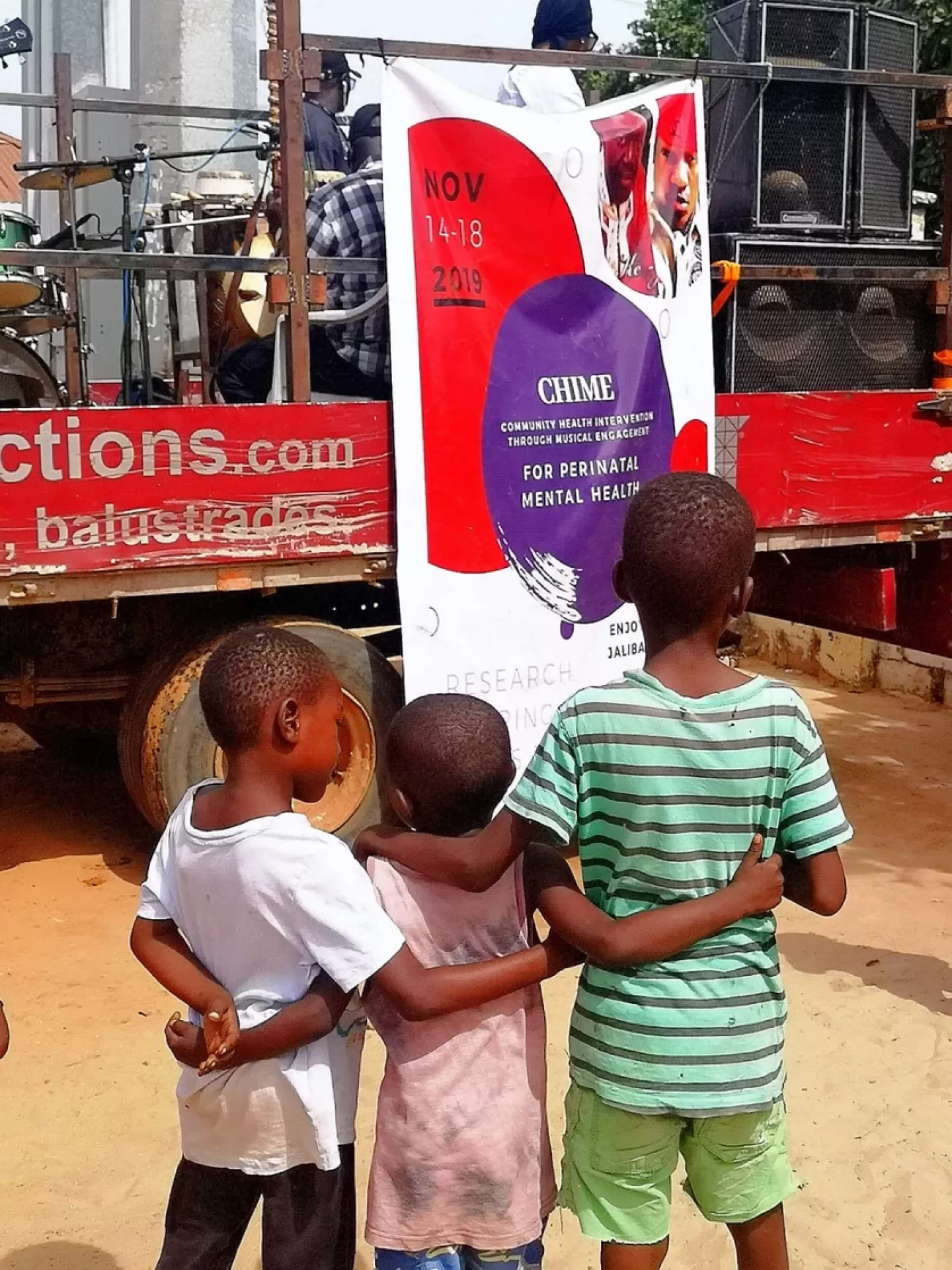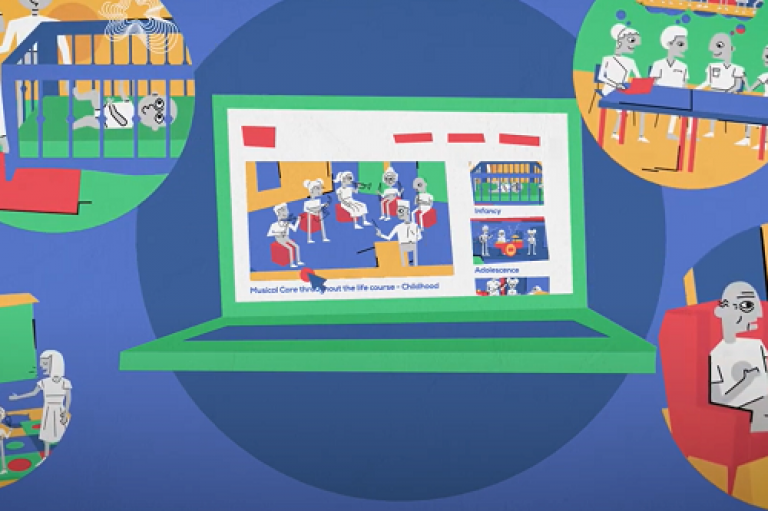Musical Care International Network aims to clarify how musical care might be relevant to other contexts, countries and cultures
By Mr George Wigmore (Senior Communications Officer), Published
The field of musical care has been rapidly developing in recent years, and a recent paper by Dr Katie Rose Sanfilippo at City, University of London has introduced the Musical Care International Network and the work that is going on to bring people together to critically discuss, and advocate for, musical care throughout the life course from different disciplinary and cultural perspectives.
Applying music within healthcare contexts
Having joined City in 2021, Dr Sanfilippo, a Presidential Research Fellow in the School of Health and Psychological Sciences and a member of the Centre for Healthcare Innovation Research, has been exploring the application of music and the arts within healthcare contexts to address health inequalities. This includes work across the globe and with musicians in the Gambia, where she notably collaborated with them to develop and facilitate a singing group intervention to support antenatal mental health and promote important healthcare messages.
After many years of work, Dr Sanfilippo co-edited a major book in 2022 with Dr Neta Spiro from the Royal College of Music that introduced the term ‘musical care’. Entitled Collaborative Insights: Interdisciplinary Perspectives on Musical Care Throughout the Life Course, the book explores the role that music – music listening as well as music-making – can play in supporting aspects of a person’s developmental and health needs.
Alongside this, the Musical Care International Network was launched in January 2022, and it has helped fill in some of the gaps when it comes to conversations around musical care and development.
“After the launch of the book, we decided that we wanted to create an international network. This was because the book was primarily written by English-speaking authors or authors that were in the UK, Europe or the US, so we recognised that there were a lot of voices and perspectives missing,” says Dr Sanfilippo. “So we created the network as a way to understand how musical care might be relevant to other contexts, countries and cultures. Music is often about community, and community is also very important within the field of musical care.”

Developing musical care
Published in the journal Music & Science, the recent paper by Dr Sanfilippo, Dr Spiro, Dr Bonnie McConnell and 31 other network members from around the world has reported on the inaugural meetings of the Musical Care International Network, which were held online in 2022. Overall, the paper aims to not only introduce the Network, but also improve our understanding of the diverse practices, applications, contexts, and impacts of musical care around the globe.
“This paper is about the initial meetings and launch of the Network. Those initial meetings involved conversations around what is musical care? What does it mean to you? How can we build this network? Since then, we've had some further meetings to discuss developing the network and what we'd like to do as a network together,” says Dr Sanfilippo.
Since its launch, the Network has also been able to provide funding for musical care events in different countries and contexts. While some are community engagement events, the Network has also received some funding to support research projects that are developing work to diversify the field. Examples include the ‘BMTN Black Musical Placemaking Initiative: Expanding Musical Care Offerings to Black Communities and Music Health Practitioners’ project in the USA, and two in South America which are teaching musical tools for care and well-being among families affected by the Zika virus and also creating musical care groups for patients, caregivers, staff and the community of the Hospital Clínica El Carmen in Barranquilla, Colombia.
Musical roots
Dr Sanfilippo has long had an interest in the interaction between music and the mind, and following a double degree in Psychology and Music, she moved to the UK to do an MSc in Music, Mind and Brain at Goldsmiths, University of London.
“During my Master’s, I realised that there are many reasons why interacting with music can be beneficial. I was really interested in applying that knowledge within healthcare contexts, and that led to my PhD work,” she says.
While doing the PhD, Dr Sanfilippo also worked as a research assistant with the music therapy charity Nordoff Robbins. The time there was spent interacting with people from many different backgrounds, including music therapists, the public, and other academics from different disciplines. This got her thinking about a way to integrate these various components.
“Together with my collaborator Neta, we realised there was a need for a concept that was able to bring together what we know about all the different types of ways in which music is used to support our health and wellbeing,” says Dr Sanfilippo. “That's how the idea of musical care came around because there are lots of different practices that are quite siloed, such as community music, music therapy, and music education. Overall, I think the field is moving in the direction where we can learn a lot if we think about them as a whole, and that's where musical care comes from.”

Musical care in the Gambia
Within the discipline of musical care, Dr Sanfilippo has done a lot of work in the global health space, and this includes researching traditional musical practices in the Gambia to develop community music interventions that support antenatal mental health.
“In the Gambia, music is just so embedded in everyday culture, and people participate in music in many different ways and many different forms. There are Kanyeleng groups, which are all female music community groups, who have gone through infertility or lost a child within the first year of life. And one way in which they support one another is through music and music making. They're also community leaders, so we worked with them to develop an intervention to support the mental health of pregnant women in their community.”
Following a feasibility trial on CHIME (Community Health Intervention through Music Engagement), which is being led by Professor Lauren Stewart at Goldsmiths, University of London, Dr Sanfilippo found that this embedded approach helped to reduce anxiety and depression symptoms. The plan now is to scale this up across the Gambia and conduct a large trial, and she has also started to develop similar work in South Africa and India with colleagues.
Another engagement project also involved commissioning two songs from famous Gambian musicians to spread the messages that it’s important to support your pregnant wife, the different ways in which you can do that, and why it’s important for your wife and for your child.
“We went into different villages with a truck which had speakers and a sound system, and the musicians would perform; everybody comes out from the community to listen to them,” said Dr Sanfilippo. “As literacy rates are low and music is so embedded in the culture, it was a great way to communicate that message.”
Future aims
As for the future, Dr Sanfilippo is also co-leading another network, named the Music for Parental Wellbeing network, with Professor Rosie Perkins at the Royal College of Music. In addition, the Centre for Healthcare Innovation is working on formulating a new structure with different labs with Dr Sanfilippo heading up an arts and health lab.
“The area of musical care sounds niche, but I think it is something that we all interact with on a daily basis,” says Dr Sanfilippo on the topic. “While the academic field is new work to others, the new structure of the Centre is going to be a really exciting opportunity for City, and hopefully we can build some momentum around this area.”
If you are interested in joining the Musical Care International Network or collaborating with Dr Sanfilippo, please visit the Network’s website or contact her directly.



